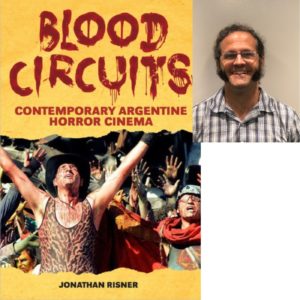Science Fiction and disaster – “The Future as Catastrophe” (Columbia University Press, 2018) – Eva Horn interview
Podcast: Play in new window | Download
Subscribe: Apple Podcasts | RSS

Eva Horn is a researcher who is interested in how various kinds of disasters are presented in literature, television, and film. We talk about her latest book on the subject.
1:28 – Eva talks about how she got into writing on this subject.
6:00 – Eva differentiates between sudden disaster and the more modern slow creeping disaster.
12:00 – Eva talks about Lord Byron’s 1816 apocalyptic poem “Darkness.”
13:40 – Eva also talks about Cormac McCarthy’s novel “The Road.” She has also looked at various blockbuster disaster movies and shows. Elysium is one film she points out as an allegory of inequality.
16:25 – Eva talks about the two movies “Minority Report” and “12 Monkeys.” She talks about the fears of being able to predict the future. She brings up the myths of Oedipus.
20:30 – Eva talks about how the book is divided up.
22:45 – People used to fear a cooling planet.
32:07 – Eva would like to see more popular interest in the old texts that discuss disaster.
33:20 – Eva loves the movie “12 Monkeys” and considers it brilliant.
34:31 – SPOILER ALERT – Eva mentions how the “12 Monkeys” ends.
35:49 – SPOILER DISCUSSION ENDS
37:10 – SPOILER ALERT – Eva discusses the setting of “The Road”
38:58 – SPOILER DISCUSSION ENDS
46:50 – Eva has an academia.edu page and a page on the University of Vienna.
For more of “The Art and Design of Sci-Fi and Fantasy, Mystery and Horror” please follow me on Facebook at crisalvarezwlc, on youtube at Cris Alvarez and on Instagram @crisalvarezscifi
Guests: Eva Horn
Host: Cris Alvarez
Tags: science fiction, 12 Monkeys, The Road, Cormac McCarthy, Oedipus, Sophocles, Lord Byron, Minority Report, Steven Spielberg, Vienna

 Jonathan Risner is Assistant Professor of Spanish at Indiana University Bloomington. He discovered Argentine horror and wondered how much of the country’s brutal dictatorship impacted that country’s horror films. We discuss his book on the topic.
Jonathan Risner is Assistant Professor of Spanish at Indiana University Bloomington. He discovered Argentine horror and wondered how much of the country’s brutal dictatorship impacted that country’s horror films. We discuss his book on the topic.